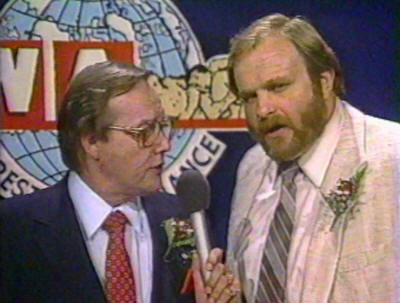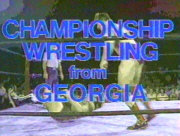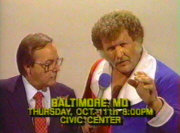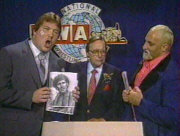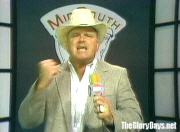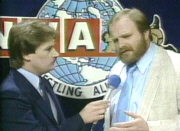By Bruce Mitchell
Special for Studio Wrestling and the Mid-Atlantic Gateway
Originally published in 2008
The line stretched all the way down the sidewalk.

We were in front of the WRAL TV studios in Raleigh, North Carolina early one Wednesday evening in 1980, waiting to get into a Mid Atlantic Championship Wrestling show taping. I was the devout fan who would leave the UNC-Greensboro Strong dorm keg parties at 11:30 sharp every Saturday night, bend the rabbit ears around, and settle in to watch a slightly snowy MACW show out of Raleigh on my portable black and white TV. The rest of the group was pretty eclectic – Johnny, one of my old high school friends, his brother Henry, a student at Duke Divinity School, their mother Rose (I still don't know how that happened) and some of the brother's buddies. This group was there for the spectacle, (Henry had worked part-time at Dorton Arena and seen some shows from the back) and included some skeptics. I was the only one who knew who all the wrestlers were and who was feuding with whom.
Henry, the Duke Divinity School student, came in handy, at least his sense of ethics did, because he created a phony church name for us to use when requesting free tickets from WRAL. They gave us more tickets that way.
Not surprisingly, Henry subsequently left the ministry to become a successful lawyer.
As we waited in line it was pretty clear some of the folks waiting with us were regulars who came to the tapings every week. I was a closet wrestling fan at this point who didn't know many other fans, so it was pretty cool to be able to eavesdrop on people in line as they speculated on what was coming next in the promotion. It would take me some years before I would become a member of a community of fans like that.
The wait was broken up a little when Rich Brenner, then the sports anchor at WRAL, came out and greeted some fans on the way to his car. Brenner was drawing huge ratings in the area at the time, and was soon lured to a big market job in Chicago. I mention this because the weekend anchor, Tom Suiter, took his place and remains at WRAL to this day. Suiter is the best local sports anchor I've ever seen, and Brenner isn't far behind. Brenner soon returned to North Carolina and recently retired from WGHP in Greensboro, another station where Mid Atlantic Championship Wrestling was taped for years, so I've been watching both guys off and on for three decades. In those days of three television station choices, local news was more intertwined in the lives of the community, so you can see how these two sports guys, their station, and Mid Atlantic Championship Wrestling are, to me, all part of the same tapestry.
 |
| WRAL today. (Photos by Dick Bourne at the Mid-Atlantic Gateway) |
After a wait almost as long as it took me to connect Tom Suiter to pro wrestling, we were let into the TV studio where the wrestling action was filmed. The first thing that stood out, obviously, was the wrestling ring. Since we were all sitting on one set of bleachers every seat in the house was close. I figured it was about as close to the front row at one of these shows as I was ever going to get.
Not only were the fans close to the ring, we were close to each other. The real job of security that night was to encourage us, as we settled into the bleachers, to "move over", "scootch down", "scrunch up", and "C'mon, let's get one more, folks," as they tried to fit everyone in before the taping started.
I, for one, was prepared for my big chance to be on TV. I worked part-time at the late, lamented South Square Mall Belk's Department Store in the Men's Budget department, so I was sporting a green three-piece polyester suit that was sure to stand out even on a black and white TV screen. The poor lady crammed up against me on that bleacher for two plus hours probably didn't notice how much I sweated that night.
It wouldn't be the first time I had been on a TV show that had been taped at that studio, either. When I was a kid my parents brought me to a taping there of The Uncle Paul Show ("And now it's time for Uncle Paul and all his friends…"). Many major TV stations had their own local kiddie show host, and Uncle Paul was WRAL's version. I dutifully marched in the Happy Birthday March that day, but my favorite part of the show was when the fleas in Uncle Paul's hat would sing their little high-pitched songs.
Interestingly enough, Uncle Paul (Paul Montgomery) was legally blind, and if you looked closely you could see him at the podium reading his Braille show notes with his fingers.
One of the coolest things about this night came before the taping. Wrestling news could be hard to come by in those days, so David Crockett, the MACW color man, walked over to casually chat with fans in the bleachers. He let us know that the Iron Sheik had recently beaten the fresh-faced favorite Jumpin' Jim Brunzell for the Mid Atlantic title, the second biggest title in the territory. Most fans were distressed at the news.
Not me. I got a huge kick out of the Iron Sheik, his unique interview style, his Iranian Club Challenge and his pointy toed boots, so I was glad he beat that goody-two shoes Brunzell. (I also noticed how the Iranian Sheik or anyone else in the promotion never mentioned the American hostages the Iranian government held at the time. I'm pretty sure the fans got the point anyway.)
Crockett let us know that Brunzell would get his re-match tonight for the title, so we had picked a good night to be there. (Many, if not most, MACW television shows of the time didn't feature main event matches, preferring to whet the appetite of fans for those matches, not quench it.)
As the show started, I looked for another high school friend, Aaron Thompson, who worked as a cameraman at the station. I wanted to see the look on his face when he saw us there, and sure enough, he recognized me and mouthed, "What the hell are you doing here?"
I just laughed.
They were taping two shows (as they usually did) that night – the syndicated hours of Worldwide Wrestling and Mid Atlantic Wrestling. Worldwide Wrestling was taped to begin the night, so that meant host Rich Landrum and the Dean of Wrestling Johnny Weaver were out first.
Rich Landrum had a real sense of style. Some of the leisure suits he wore on the show could hold their own even against David Crockett's assortment of multi-colored sport coats, and he had one of the great perms of the era.
Landrum was also a smooth, enjoyable play-by-play man who had a real respect for the wrestlers and what they did. He had a pleasant chemistry with Johnny Weaver, and it wasn't surprising to hear that they resumed their friendship in recent years. Weaver used to tell Landrum whenever some wrestler was trapped in, the corner of, say, The Masked Superstars I & II, with no hope of making a tag, that the poor guy was caught in "Rich Landrum's No Man's Land."
What, you thought "Stone Cold! Stone Cold! Stone Cold!" was the first announcer catch phrase?
Weaver's trademark on Worldwide Wrestling, of course, was singing Willie Nelson's "Turn Out The Lights, The Party's Over" as some hapless wrestler was clearly beaten once a show, just like Don Meredith did back then on Monday Night Football when the game was clearly over. I say, of course, but former WCW announcer Chris Cruise didn't believe me when I insisted he include that in his introduction of Johnny Weaver for his induction into the NWA Legends Hall of Heroes.
Cruise, who grew up in Maine watching Chief Jay Strongbow, thought I was ribbing him (even after a lot of yelling), so he asked the audience at the Hall of Heroes ceremony, "What was it that Johnny sang?" and was surprised when the fans sang one last time for the Dean.
Mid Atlantic Championship Wrestling had a great talent roster back then. Ric Flair was the top star, the heroic U.S. champion and number one contender to Harley Race's NWA Heavyweight championship (at least in the Mid Atlantic and sometimes St. Louis territories), and watching him up close laser-in on the camera with that supreme confidence was something to see. I was disappointed that Blackjack Mulligan wasn't there that night, as I would have loved to hear him go on about Reba Joe and just how they settled things out back at two in the morning. Greg Valentine was strong and mean, and even then I knew he was an exceptional wrestler. I was also a big fan of Ray "The Crippler" Stevens talking out of the side of his mouth. You knew he could whip any and everybody's asses in the bar, no problem.
Jimmy Snuka was, to that point in my life, the single biggest and scariest bastard I'd ever seen. I had just watched Flair beat him for the U.S. title in the Greensboro Coliseum. Five years later, though, that same size would put Snuka in the middle of the pack for pro wrestlers.
Number 1 Paul Jones had just turned back good after an entertaining NWA World Tag Team Championship run with Baron von Raschke and a brief stint in Florida Championship Wrestling as Mr. Florida. I enjoyed the stories in the wrestling magazines about the mystery behind Mr. Florida's identity, when one look at Mr. Florida's picture solved the riddle for me. (I didn't enjoy the looks on the convenience store clerk's faces when I bought the magazines, with their blood-soaked cover shots, to the counter.)
Ricky Steamboat & Jay Youngblood were there, and they are still the single best, most effective tag team I've ever seen. Their synchronized style paved the way for all the great tag teams that followed that decade, and man, did their devoted fans love them. They would erupt in ecstasy and relief when, say, Youngblood finally, finally, escaped the double-teaming of Jones & Von Raschke and tagged in Steamboat for some much deserved retribution.
It was cool to see the guys cut their promos for the syndicated shows, how they calmly waited for the cue and then either revved themselves up for revenge, or matter of factly explained why it only looked they were cheating.
I was disappointed I didn't get to see the wrestlers do my favorite part of the show – the localized promos that came at the second and last breaks on the hour. (I didn't know that taping those promos took hours every week, what with all the markets the company had to cover.) First the bad guys would hype the matches and explain the stipulations for the next local show, then the good guys would get the last word, since (hopefully) they spoke for the fans.
The fun part was how the wrestlers would drop in local color, including the clubs they might party in after the matches, and try to out-do and entertain the other wrestlers who were waiting their turn to talk. Like any sport, pro wrestling had its own code. For example, if, on a local promo, Ric Flair said the magic words, "bleed, sweat, and pay the price of a wrestling lifetime," someone was going to catch a beating at the local arena.
On the other hand, if Paul Jones said, "Let me tell you something right now", that meant Paul Jones was going to tell you something right then.
Even the localized promos had a WRAL flavor, wherever you were watching them, because the man who intoned the deathless words "
Let's take time for this commercial message about the Mid Atlantic wrestling events coming up in your area" (code for "Head's up – here comes the good stuff") was the station's then Biggest Name in Weather, Bob Debardelaben.
The matches on Worldwide Wrestling were pretty straightforward that night. The main event wrestlers took on the likes of Nick DeCarlo, Young Lion Vinny Valentino, Don Kernodle (who would main event his hometown of Burlington, North Carolina years before he main evented the entire territory) and veterans like Abe "Kiwi Roll" Jacobs and Swede Hanson, who at that point may have sported the greatest perm in the sport's history, better than Landrum's or Canadian Champion Dewey Robertson's.
My favorites on this side of the roster were Tony Russo and Ric Ferrara, who looked like beer kegs with short, stumpy legs. They teamed together this night, I couldn't tell you against who, and the crowd enjoyed their work, well, actually they enjoyed the slightly risqué sight of their boxer shorts peeking over the tops of the trunks, the first hint of what Russo and Ferrera would bring to the business in the years to come.
One of the coolest moments of the night for me came just after the Worldwide Wrestling taping ended. Rich Landrum caught the attention of referee Sonny "Roughhouse" Fargo, who was still in the ring, and pantomimed with a nod and a wrist twist asking Fargo whether he wanted to have some refreshment later. Why they didn't invite me to go with them I'll never understand. Maybe it was the green polyester suit.
The Mid Atlantic Championship Wrestling show was taped next, and the long-time voice of MACW, Bob Caudle, came out. Caudle was a former weatherman at WRAL. He worked during the day for the Constituent Services department of North Carolina Senator Jesse Helms, the former news director and editorialist at WRAL.
(No wrestler or politician ever cut more effective promos than the ones Helms delivered during his famous "Viewpoint" editorials on the station – " I don't know why taxpayers would be asked to build a zoo in Asheboro when you could just put a fence around Chapel Hill.")
David Crockett joined Caudle. Crockett told wrestling fans directly who to root for and why, so enthusiastically that many fans secretly enjoyed it when bully Greg Valentine knocked him on his butt for sticking his nose in his and Ray Steven's business one too many times.
It was time for the promised main event – Jim Brunzell's chance to regain the coveted Mid Atlantic title from the Iron Sheik. Up to then, the fans in the studio had enjoyed the matches, but they had a strong idea who was going to win each match, and the skeptics, at least in my little group, remained unconvinced.
Jim Brunzell was the well-mannered All American boy who any dad would be proud to have take his daughter to the church social, and stood in stark contrast to the foreign born Iron Sheik. He may have had the biggest teeth in wrestling.
Now, though, it was time for Jumping Jim to get his chance for revenge. You see, Brunzell had had the Iron Sheik all but beaten in their last championship match, when the referee unfortunately went down, young idealistic Brunzell went to help him up, and The Sheik took his opportunity to tap his right boot toe-first three times on the mat.
Why did The Iron Sheik do such a strange thing at such a critical time in this championship match? His manager, Gene Anderson of the famed "A table with three legs cannot stand" Anderson Brothers championship tag team, explained that the Sheik had problems with circulation in his legs, and was just banging on the mat to get the feeling back in his foot.
Brunzell claimed that The Iron Sheik did that to load the curved end of his boot with lead.
Whatever the reason, The Iron Sheik did what he did, then kicked Brunzell in the ribs, Brunzell went down like a shot, the revived referee counted three, and the entire Mid-Atlantic area was ruled by a champion from Iran, the country that refused to return our American hostages.
So, as you can see, there was a lot at stake in this re-match. What made it even better was that both Jim Brunzell and The Iron Sheik were, at the time, damn good wrestlers and a top level performance in a match like this across the MACW syndicated TV network might lead to big money main events for both.
Brunzell had a tremendous standing dropkick and The Iron Sheik at that point in his career had an array of suplexes second to no one in the sport. (Sadly, a few years later, during his famous WWF run, he had lost much of both his in-ring energy and suplex array.) The two tore the studio down (if only symbolically, since the action stayed in the ring) from the very beginning of the match.
That action picked up even further, though, when it became clear Brunzell had lost his manners and was up to something more than just beating The Iron Sheik for the title - something that the Sheik and his manager Anderson were desperate to stop.
Pandemonium.
Brunzell was trying to rip the Iron Sheik's allegedly loaded boot right off his leg, and the fans in the studio, who clearly thought he was justified in this action, were going crazy.
Brunzell got the boot, too, but, alas, he was disqualified and lost this chance to regain the Mid Atlantic title for the people of the area. What Brunzell did get, thanks to a ruling from the athletic commission, the National Wrestling Alliance, the promotion, somebody important, that fair was fair, and he deserved the right to wear that boot, the same boot The Iron Sheik kicked him with to win the Mid Atlantic title, in any subsequent rematches for the belt.
Anderson and the Sheik protested, but to get what was now Brunzell's boot banned they had to admit the boot was loaded in the first place, and risk both having the title win rescinded and getting suspended from the territory. This was the best wrestling territory in the country, so they couldn't have that.
So, you see, Brunzell was a shoo-in to get his revenge and regain the Mid Atlantic championship from the hated Iranian. After all, he had the Sheik's loaded boot, and the right to use it.
I mean, you had to buy a ticket for that match when it came to your local area, right? A Brunzell title win was virtually guaranteed!
I knew I was in the hands of master craftsmen when, after that match, one of the skeptics turned to another and said, "I don't know about the rest, but that last match was real!"

More from Bruce Mitchell on the Mid-Atlantic Gateway:
A Thanksgiving Surprise: Starrcade Magic Returns to Greensboro
The Lightning and Thunder of the Nature Boys
For more information on the history of wrestling at WRAL television studios from the 1950s to the 1980s, visit the WRAL page at the Studio Wrestling website (part of the Mid-Atlantic Gateway family of websites.)
This article was first published on the Mid-Atlantic Gateway in support of the Studio Wrestling history section of the Gateway in 2008, and again in 2011 for the Studio Wrestling website.
